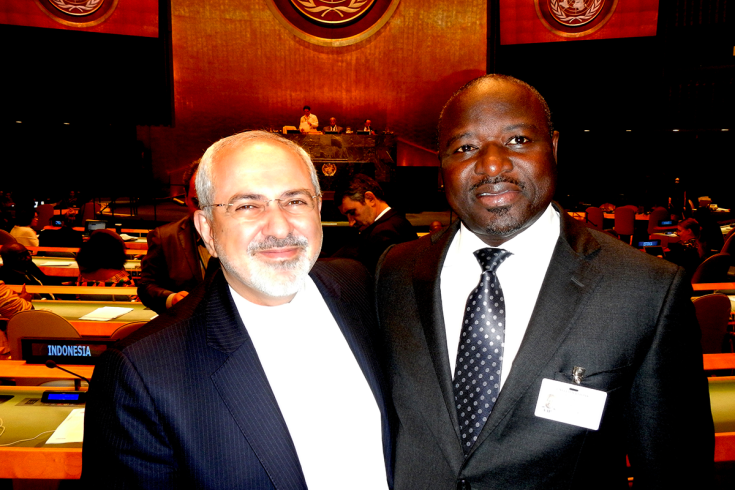Executive Secretary meets Secretary of State John Kerry and other world leaders
Renewed commitment by the United States to work towards CTBT ratification
Concluding his two-week visit to the United States, the Executive Secretary of the Preparatory Commission for the Comprehensive Nuclear-Test-Ban Treaty Organization, Lassina Zerbo, met United States Secretary of State John Kerry on 26 September in New York, on the margins of the high-level segment of the United Nations General Assembly.
Kerry and Zerbo discussed the ongoing efforts by the Obama Administration to make progress towards U.S. ratification of the Comprehensive Nuclear-Test-Ban Treaty (CTBT) and the strengths of its verification regime. Under Secretary of State for Arms Control and International Security, Rose Gottemoeller, accompanied Kerry.

CTBTO Executive Secretary Lassina Zerbo (left) and U.S. Secretary of State John Kerry. Centre: Rose Gottemoeller, Under Secretary of State for Arms Control and International Security
[The CTBT] verification regime is one of the great accomplishments of the modern world. The international monitoring system is nearly complete; it is robust, it is effective, and it has contributed critical scientific data on everything from tsunami warnings to tracking radioactivity and nuclear reactor accidents.
UN Secretary-General and 30 foreign ministers push for CTBT entry into force
Together with UN Secretary-General Ban Ki-moon, and foreign ministers and senior officials from around 90 countries, Kerry and Zerbo participated in a Ministerial Meeting chaired by Japan’s Foreign Minister Fumio Kishida. The biennial CTBT Ministerial Meetings are an initiative of the group of “Friends of the CTBT”, whose members include Australia, Canada, Finland, Germany, Japan, Mexico, the Netherlands and Sweden.

United Nation Secretary-General Ban Ki-moon

The meeting was chaired by Japan's Foreign Minister Fumio Kishida

U.S. Secretary of State John Kerry

CTBTO Executive Secretary Lassina Zerbo
Consultations at the highest level
While at the General Assembly, the Executive Secretary held consultations and met with several heads of State and foreign ministers on matters ranging from universalization and entry into force of the Treaty, to the build-up of the IMS and payment of assessed contributions. The heads of State included President Serzh Sargsian (Armenia), Interim President Catherine Samba-Panza (Central African Republic), President Idriss Déby (Chad), President Michelle Bachelet (Chile), President Denis Sassou-Nguesso (Republic of Congo), President Ali Ben Bongo Ondimba (Gabon), President Alpha Condé (Guinea), President Mohamed Ould Abdel Aziz (Mauritania) and. President Salva Kiir Mayardit (South Sudan).

Meeting with the President of the Republic of Congo, Denis Sassou-Nguesso (left)

Meeting with the Foreign Minister of the Islamic Republic of Iran, Mohammad Javad Zarif

Italian Foreign Minister Federica Mogherini, designated EU High Representative for Foreign Affairs and Security Policy and member of the CTBT Group of Eminent Persons
Although the Treaty is yet to come into force, the nuclear test moratorium has become a de facto international norm. However, without the lasting and legally-binding effect of the entry into force of the Treaty, such a norm remains fragile.

CTBT Ministerial Meeting - Friday, 26 Sept. 2014
| State/Chair | Speaker | |
|---|---|---|
| 1 | Joint Ministerial Statement [PDF] |
States committed to ratify the Treaty |
| 2 | Welcome remarks by The Chair [PDF] |
H.E. Mr. Fumio Kishida, Minister for Foreign Affairs of Japan |
| 3 | United Nations Link |
Mr. Ban Ki-moon United Nations Secretary-General |
| 4 | United States [Link] |
H.E. Mr. John Kerry Secretary of State, USA |
| 5 | Germany [PDF] |
H.E. Mr. Frank-Walter Steinmeier Federal Minister of Foreign Affairs of Germany |
| 6 | Comprehensive Nuclear-Test-Ban Treaty Organization [PDF] |
Mr. Lassina Zerbo, Executive Secretary |
| 7 | Netherlands |
H.E. Mr. Frans Timmermans Minister of Foreign Affairs of the Kingdom of the Netherlands |
| 8 | Statement by the Article XIV Co-Chair - Indonesia |
H.E. Mr. Marty M. Natalegawa Minister of Foreign Affairs of Indonesia |
| 9 | Republic of the Congo |
H.E. Mr Basile Ikouébé Minister of Foreign Affairs and Cooperation of the Republic of the Congo |
| 10 | Canada |
Ms. Kerry Buck Political Director and Assistant Deputy Minister for International Security |
| 11 | European Union [PDF] |
The Hon Federica Mogherini EU-High Representative designate and Minister for Foreign Affairs of Italy |
| 12 | Iraq [PDF - Arabic] |
H.E. Dr. Ibrahim Al-Jaafari Minister of Foreign Affairs of Iraq |
| 13 | Australia [PDF] |
Ms. Harinder Sidhu, First Assistant Secretary, Multilateral Policy Division, Department of Foreign Affairs and Trade |
| 14 | Algeria [PDF - French] |
H.E. Ramtane Lamamra, Minister of Foreign Affairs of Algeria |
| 15 | Argentina [PDF - Spanish] |
H.E. Edurado Zuain, Deputy Minister of Foreign Affairs of Argentina |
| 16 | Finland [PDF] |
H.E. Ambassador Kai Sauer, Permanent Representative of Finland to the United Nations |
| 17 | Hungary [PDF] |
H.E. Dr Istvan Mikola, State Secretary representing the Hungarian Minister of Foreign Affairs and Trade in his capacity as the Co-President of the Article XIV Conference. |
| 18 | Jordan [PDF - Arabic] |
H.E. Nasser Judeh, Minister of Foreign Affairs and Expatriates of the Hashemite Kingdom of Jordan |
| 19 | Latvia [PDF] |
Ms. Baiba Braže, Ambassador, Director-General for Security Policy and International Organizations, Ministry of Foreign Affairs of Latvia |
| 20 | Marshall Islands [PDF] |
H.E. Tony deBrum, Minister of Foreign Affairs Republic of the Marshall Islands |
| 21 | Russia [PDF] [PDF - Russian] |
Mr. Alexey Yu. Karpov, Deputy Director of the Department for Nonproliferation and Arms Control of the Ministry of Foreign Affairs of the Russian Federation |
29 Sep 2014
